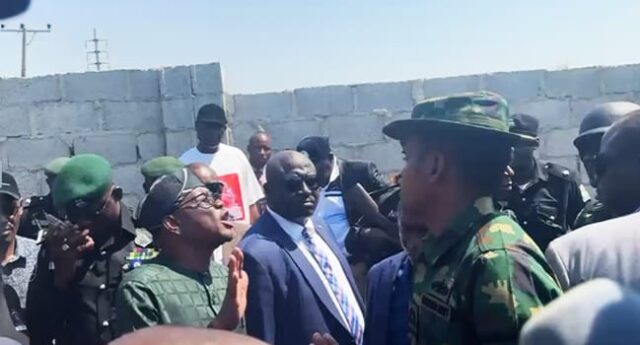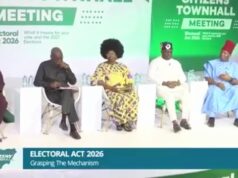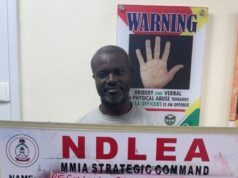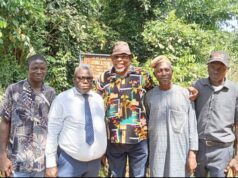A civil advocacy group under the banner of #Nigeria Unite, has petitioned major Western governments and international institutions, including the United States, United Kingdom and the European Union, the Federal Capital Territory Minister, Nyesom Wike, over what they call role in Nigeria’s democracy decline
In the petition titled “Imminent Collapse of Democracy in the Sahel Region (West Africa)”, the group expressed deep concern over what it called the “systematic erosion of democratic institutions” in Nigeria, warning that the country’s political trajectory mirrors the instability already engulfing parts of the Sahel.
The document, signed by the group’s national secretariat, Sunday Daniel, and addressed to the U.S. House of Representatives in Washington D.C., the European Commission in Brussels, the U.K. Foreign, Commonwealth and Development Office, and key international figures including Senator Ted Cruz and European Commission President Ursula von der Leyen.
He called on the diplomatic intervention to protect Nigeria’s democracy and stability amid what it described as a growing authoritarian drift.
The petition linked the decline of democratic norms in Nigeria to alleged abuses of power by Federal Capital Territory Minister, Nyesom Wike, accusing him of “intimidation, bribery, and manipulation of state institutions” to weaken opposition parties and consolidate control.
According to the petition, the decline of democratic norms in Nigeria is linked to alleged abuses of power by Federal Capital Territory (FCT) Minister, Nyesom Wike, whom it accused of “intimidation, bribery, and manipulation of state institutions” to weaken opposition parties and consolidate control.
Citing ongoing instability in Mali, Burkina Faso, and Niger, three Sahelian nations under military rule, the group warned that Nigeria’s democratic backsliding could have “catastrophic regional and global consequences,” including rising insecurity, migration pressures, and humanitarian crises.
Daniel said: “We urge the African Union, the United States, and the United Kingdom to take a proactive stance in safeguarding democracy in Nigeria. Diplomatic engagement, monitoring electoral processes, and offering support to civil society organizations are essential steps in this endeavour.
“We implore the international community to impose targeted sanctions against Nyesom Wike, the architect of many of these anti-democratic machinations. Measures such as visa bans, and the confiscation of assets abroad would send a clear message that the international community will not tolerate the undermining of democratic principles.
“In addition to targeting Wike, we advocate for similar punitive measures against the compromised judges and police officers who facilitate the enforcement of his schemes. Holding these individuals accountable is crucial for restoring the rule of law and rebuilding public trust in Nigeria’s democratic institutions.
“We strongly advocate for the immediate sanctioning of public judicial officials implicated in collusion with Wike in this alarming scheme. Noteworthy among these individuals are John T. Tsoho, Peter Odo Lifu, Joyce Obehi Abdulmalik, and James K. Omotosho, whose actions undermine the integrity of our judicial system.
“Additionally, the Commissioner of Police of the Federal Capital Territory and the Independent National Electoral Commission must be held accountable for their roles in this troubling alliance. Ensuring accountability is essential to restore public trust and uphold the rule of law in our democratic processes.”
The group warned that failure to act could lead to the “complete destabilization of sub-Saharan Africa,” emphasizing that Nigeria’s democratic integrity remains essential to the stability of the Sahel and the broader African continent.
He added, “We the undersigned citizens and advocates express concern about declining democratic institutions in Nigeria which is Africa’s largest democracy. The deterioration of democracy in the Sahel region signifies a regional crisis that poses a growing threat to international peace and stability with direct implications for migration control, affecting Europe.
“The current trajectory of political events in the Sahel region of West Africa suggests an imminent collapse of democracy that threatens not only Nigeria, the largest democracy in the Black world, but also the stability and democratic integrity of the entire Sahel region.”
The petition further accused the All Progressives Congress (APC) of using coercion, intimidation, and inducement to dominate Nigeria’s political space, warning that the pattern of mass defections from opposition parties could transform the country into a de facto one-party state reminiscent of the military era.
The group alleged that Wike’s actions had deepened internal crises within the People’s Democratic Party (PDP), Labour Party (LP), and African Democratic Congress (ADC), eroding internal democracy and weakening the opposition’s ability to compete ahead of the 2027 general elections.
He Further said: “The All Progressive Congress (APC) has used coercion, intimidation and inducements to muscle the political space in Nigeria overshadowing the facade of multi-party democracy. This forceful bulldozing has affected opposition parties like the People’s Democratic Party (PDP) and the Labour Party (LP), weakening their ability to challenge effectively.
“There is a significant influx of politicians, including governors, senators, and local government officials, forced to switch to the APC, posing a threat to the diversity of Nigeria’s political landscape.
“The continuous defections to the APC raise concerns about Nigeria transitioning into a one-party state, stifling opposition voices and compromising the democratic process in the style of the late General Sani Abatcha.
“The African Democratic Congress and LP face internal struggles caused by the actions of Wike, further weakening the opposition and diminishing the chances of a robust democratic process.
“Beyond the ADC and the LP, Wike’s criminal encroachment extends to the internal workings of the PDP, where the National Working Committee (NWC) suspended several National Officers due to anti-party activities. This suspension is in accordance with specific sections of the Party’s Constitution, and the suspended officers will face a one-month suspension, subject to review by the National Disciplinary Committee.
“However, Wike’s use of state resources to seal the PDP Secretariat raises concerns about the legitimacy of the party’s internal governance and the potential for the INEC to recognize the suspended individuals as legitimate leaders. If the trend continues unchecked, future elections in Nigeria may become mere endorsements of predetermined outcomes, leading to a democracy devoid of choice, competition, and accountability.
“The erosion of democratic norms in Nigeria is further exacerbated using public resources to lure opposition leaders into the ruling party. While constitutional provisions allow for party-switching, the reckless deployment of state resources to entice dissenting voices to defect undermines the very essence of democratic competition. This practice not only fosters a culture of corruption but also creates an environment where opposing views are systematically silenced.
“The allocation of resources is starkly unequal. Governors from the ruling party are showered with immense financial support, while their counterparts from opposition parties are deliberately starved of resources, effectively crippling their ability to function and compete in the political arena. This imbalance further consolidates power within the ruling party and diminishes the prospects for a robust democratic process leading up to the 2027 elections.
“The Gagging of Opposition Voices
As the political environment in Nigeria becomes increasingly oppressive, we witness the gradual gagging of opposition voices. The chilling effect of state-sponsored intimidation and coercion leaves little room for dissent. With the 2027 elections on the horizon, the absence of a vibrant opposition could culminate in a political environment devoid of accountability, transparency, and genuine democratic choice.”
According to the petition, public resources are being used to “lure opposition leaders into the ruling party,” creating a culture of corruption and silencing dissent. It also criticized the National Assembly for being “overwhelmed by the executive,” accusing it of failing in its constitutional duty of oversight and accountability.
The group warned that the continued suppression of dissent and politicization of state institutions could trigger mass unrest and regional instability, stressing that a collapse of democracy in Nigeria, Africa’s most populous nation, would have far-reaching consequences.
“The destabilization of Nigeria, with its population of 250 million people, will have repercussions across Africa and beyond,” the statement added. “It will threaten peace, increase migration to Europe and the U.S., and worsen the humanitarian and security situation in the Sahel,” he said.
Discover more from TheTimes Nigeria
Subscribe to get the latest posts sent to your email.









